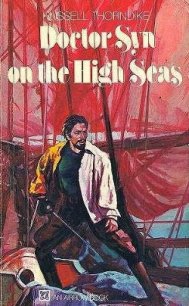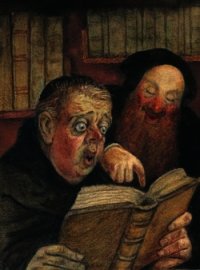The COURAGEOUS EXPLOITS OF DOCTOR SYN - Thorndike Russell (книги онлайн полные TXT) 📗
would be a vast expense and trouble if they made you put it back again, if you get me?”
“You can take it form me,” retorted Finn, “that once the Knoll is down the expense will be theirs, since they will
have to alter the existing charts. I know something of the Law too, and the most jealousy guarded rule of England is
that an Englishman may do what he likes with his own. The Knoll is mine and I shall do what I like with it. Have
you any objection, Reverend Sir?’
“I should be sorry to see it go, I confess,” replied the Vicar of Dymchurch. “It is a pleasant spot to look at in fine
weather, and in foul, why, it is pleasant to think of it as a safety guide to homing sailormen.”
“Well, I am afraid both you and the Scarecrow will be disappointed by my action,” snapped Finn.
“You may associate me with the scoundrel, if you please,” said Doctor Syn. “But you must agree that our
motives in this case of sane thinking are entirely different. His are selfish, while mine are altruistic.”
“I have no wish to quarrel with you, Doctor Syn,” replied Finn, more kindly. “You are an honest man, I know,
and try to see things from other people’s point of view. Therefore you are the only one I shall regret hurting when I
pull down the Knoll. And, by the way, I wonder my ancestors have not been at it before me, for the antiquaries say
that the mound on top is man-made: either Druid or Roman, and inside it there may be all manner of buried
treasure.”
“At least such discovery would go a little way to compensate us for its loss,” said the Vicar. “But I do urge you,
once more, to make sure how you stand with the Admiralty.”
“Damn the Admiralty,” exploded Finn. “Anyway, I am going to pull it down, and if needs be apologize for my
act afterwards. I can at least give them the excuse that the Knoll is mine and not theirs.”
Returning to Dymchurch the Vicar let Captain Blain know of Farmer Finn’s attitude towards the Naval Rights,
and when his guest had retired to bed saying that he would send a report the next day to Admiral Troubridge at the
Admiralty concerning Finn’s attitude, Doctor Syn admitted Mipps to the study, where, over a bottle of the best
brandy, the two rascals put their heads together in order to find the best way in thwarting Finn’s design.
Determined to carry out his project without further delay, Finn sent up into the weald of Kent for laborers. Here
he was equally unsuccessful, for his agents found that the Scarecrow had been word-passing before him, instructing
his agent in every village to let it be known that it would be highly dangerous for any man to accept Finn’s offer of
work.
Only one man disregarded the warning, and Finn welcomed him with open arms. A man of gigantic strength,
Knarler had been a slaughterman at Cranbrook, but had been discharged from his post for cruelty. He was the type
that Finn needed. A man not to be bullied by the local opinion against him, for he assured Finn in the strongest
terms that he feared neither God nor man, and had no terror for old curses. He even expressed the hope that the
scarecrow might oppose him in person so that he could knock him out and carry him before a Justice of the Peace.
“For I can do with that there reward upon his head,” he laughed.
On inspecting the Knoll he assured the farmer that although he could do it singlehanded, if need be, it would take
some time. Indeed he planned to make the job as long as possible, since it was double money an hour.
Needing money, Finn allowed him a little in advance, so that he could refresh himself at the ‘Walnut Tree.’
The landlord of the inn, however, happened to be the Aldington agent for the Scarecrow, and told Knarler plainly
that strangers were not very welcome by his patrons.
Knarler pointed out that so long as he kept sober and paid his way no landlord could refuse him service.
Shunned by the villagers, s though he had the plague, Knarler thought of a good way to retaliate. He went to his
employer and asked for authority to make Finn’s tenants help in the work.
“I tell you they are stubborn, and will neither be persuaded nor compelled,” replied Finn. “Besides, they are
afraid of the Scarecrow. That’s obvious. They will refuse.”
“Not is you give them notice to give up their cottages,” laughed Knarler. “If I begin throwing their furniture,
women and children into the village street. You own the cottages and there would be no shelter for them. That
would make their men work, and under me, as your foreman, they’ll work hard.”
To do him justice, Farmer Finn was horrified at the man’s brutality. Angry and obstinate over the whole
business, he would not tolerate such cruelty to gain his ends.
Knarler tried to persuade him to his way of thinking, because he had stupidly boasted of what was going to
happen to the tenants at the inn, and when the farmer’s refusal to this tyranny became known, they would laugh at
him for his failure, and hate him for the instigation of such a plot.
When Knarler first mounted the Knoll, armed with pick, spade and shovel, he was conscious that every eye in the
village was watching him, so to cheat them of a view of his proceedings, he climbed over the summit and started to
work a few feet below upon the sea side. This was also more convenient as Finn’s sheep were grazing on the land
side. One of the Scarecrow’s men was glad of this, since it saved him from a climb and having to bear a message to
Knarler, for his orders had been explicit.
“It is necessary for the Scarecrow’s plan that the cutting on the Knoll shall start on the sea side. Should this
Knarler begin work upon the land side, you will take him orders from Farmer Finn to start on the sea side. As one
of Finn’s tenants and farm laborers, he will not suspect this order as coming from any other than your master.”
For what reason the Scarecrow had given this order the fellow could not guess, but the loathing that everyone felt
for Knarler since his plan of unhousing women and children, made him glad that he could avoid the contact of the
message. Greatly relieved, he left his station at the foot of the Knoll, and went back to the ‘Walnut Tree.’
He found the friendly old bar parlor filled with men discussing Knarler with animosity. They had begun to drink
early because they knew he was away working and that the ‘Walnut’ would be sweet again without him.
“Why trouble yourselves with him?” advised the man who was to have been the Scarecrow’s messenger. “He
can only bring harm to himself by doing work for Finn’s money that is accursed. And we mustn’t blame Finn too
much. He’s obstinate over this, but he’d sooner be paying us his money that him from Cranbrook. At least Finn did
not fall in with his devilry about turning us out under the sky. Finn has too much of his family in him to be a bad
landlord to us.”
“And that’s true enough,” echoed the landlord of the ‘Walnut Tree.’
“And let us not trouble our peace about this Knarler,” went on the other. “He’ll work out his own damnation,
you’ll see.”
Meanwhile Knarler worked on alone, and as he thought unwatched. He was determined to surprise his employer
as to his capacity. At least on the first day of the job. He determined not to return to Cranbrook till he had money
enough to make all envious, and with which to settle old scores. He would make himself a power with this Finn,
and cause the lazy village of Aldington to dance vigorously to his tune. Every swinging stroke of his pick into the
chalk he imagined to be the cleaving of one of their skulls. Cleaning a filled-in pit of old rubbish, he picked out a




